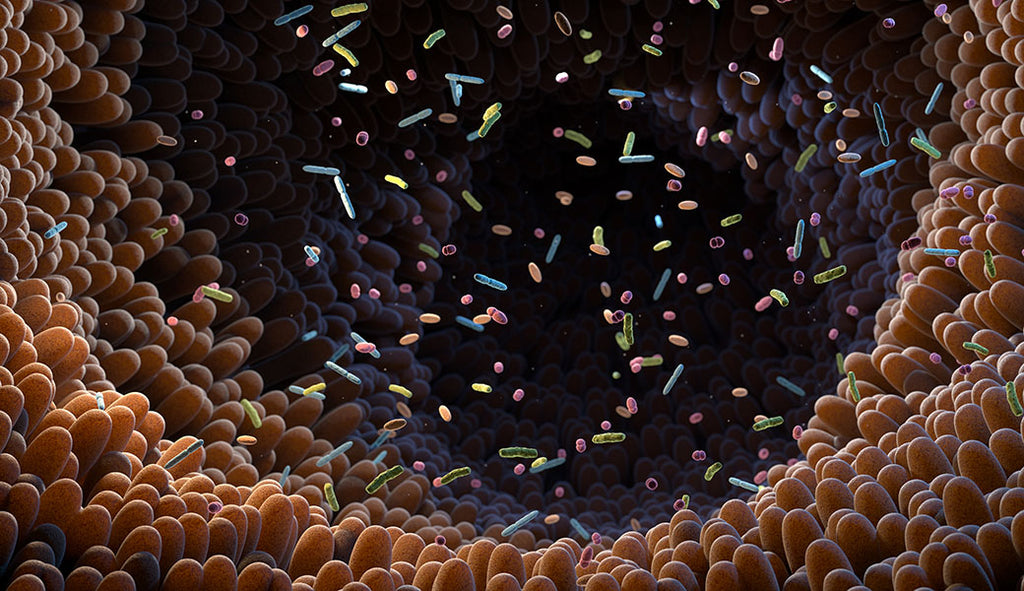The Best Supplements for Gut Health
From our mouths and stomachs to our intestines and colons, our gastrointestinal system is responsible for digesting what we eat, absorbing nutrients, and eliminating waste. The star of the digestive show is our small and large intestines, which are more commonly known as the “gut”.
Despite an uptick in research on gut health in recent decades, there still isn’t one solid, universal definition of gut health. In general, you can think of gut health as the well-being of your overall digestive system. But oftentimes, especially when it comes to the gut microbiome, gut health refers to your intestines in particular.
Research has shown that both gut and overall health is closely linked to the gut’s microbiome, the symphony of microbes that live in our large and small intestines. It’s clear that gut health matters, but what makes for a healthy gut exactly? What about the gut microbiome—how do we take care of that?
Read on for more about what the research says about gut health, the gut microbiome, and what supplements can help you along your journey to optimal gut health.
Why gut health matters
Research has shown that gut health is linked to immune health, cardiovascular health, sleep, and even mental health. Because it’s the part of our body responsible for absorbing all of the nutrients we take so much care to consume, the health of our gut is directly related to our ability to absorb the nutrients that our bodies rely on. Nutrients are then deployed across our bodies to power everything our bodies do—from sending messages to and from our brains to building strong bones and muscles—to keep us happy and healthy.
When it comes to what keeps our gut healthy, the leading answer is the gut microbiome.
The gut microbiome’s role in gut health and overall health
We begin accumulating the trillions of microorganisms that compose our gut microbiome from our very first moments of life. From passing through the birth canal and breastfeeding to exploring our earthly environment and taking our first bites of food, we’re constantly adding new microbes to our gut microbiome by simply going about life.
So far, the resident microbes of our gut microbiome have enjoyed more research and attention than unwelcome microbes that can find their way in from food or our environment. We know that some bacteria are more helpful than others. But don’t stress—believe it or not even the “bad” bacteria have roles to play in a healthy gut microbiome. As long as we have enough good bacteria present, they’ll usually do their part to keep the bad ones in check.
So, the key to a healthy gut microbiome? Balance!
Think of your gut microbiome as the ecosystem that it is. Just like any other ecosystem, it all hinges on a delicate balance that keeps all of its parts in symbiotic check. When your gut microbiome is balanced, none of the microbes are taking over the others—each is doing its unique part to help your gut microbiome do what it does best: help your body with its many important processes, from identifying threats to producing serotonin.
The best supplements for gut health
The best way to maintain a healthy gut and gut microbiome is through diet. Eating a variety of whole, plant-based foods is the foundation of both health in general and a healthy gut and gut microbiome.
Probiotic foods like miso, yogurt, and fermented foods help bolster the good bacteria in your gut microbiome. Prebiotic foods that are high in dietary fiber like vegetables, beans and legumes, fruit, whole grains, nuts, and seeds are fuel for your gut and your microbiome. Gut microbiomes ferment fiber, so by eating high-fiber foods, you’re helping it get the good bacteria it needs. Recent research suggests that fiber might also help gut microbiomes extract nutrients that would otherwise just pass right through, unabsorbed.
Finally, making sure that your diet offers plenty of polyphenols (a compound found in plant-based foods), drinking plenty of water to help with digestion, and limiting processed foods that often lack the nutrition our bodies need can also help boost gut health.
But eating healthy isn’t always easy. Whether you’re traveling, busy with work, or simply have other things demanding your attention, eating healthy can easily fall by the wayside from time to time. Other times, genetics, age, or other factors outside your control can influence how your gut functions and feels.
That’s where gut health supplements come in!
Whether you’re looking to make sure your gut microbiome has everything it needs to thrive or are looking for some temporary support, there are a number of gut health supplements ready to assist.
Barley grass for gut health
Per serving, barley contains around three times more fiber than oats do, which means that our fiber-loving guts love barley. Barley grass in particular is especially helpful for gut health—it’s positively packed with the dietary fiber that feeds our gut’s good bacteria and helps keep the not-so-good kinds in check.
But even barley grass juice has digestive benefits to offer sans fiber. It’s highly alkaline and contains essential electrolytes like sodium and potassium, which means it helps equalize pH and promotes fluid balance for healthy digestion.
Barley grass juice powder is a quick way to get the benefits of barley grass in an easy scoop. Our Organic Barley Grass Juice Powder offers all the benefits of barley grass without the hassle or mess of juicing.
Magnesium for gut health
There are so many benefits of magnesium. As the fourth most abundant mineral in our bodies, it’s involved in more than 300 enzyme processes, including those that promote and regulate digestion in the intestines.
Magnesium can help keep our digestive systems functioning properly, but a whopping two-thirds of the Western world doesn’t get enough magnesium through diet alone. That’s where a magnesium supplement can help.
Magnesium plays an essential role in gut motility and healthy elimination by supporting smooth muscle contraction along the digestive tract. Plus, research suggests that magnesium plays a role in helping to strike balance in the gut microbiome.
Probiotics for gut health
Like magnesium, the benefits of probiotics are many. When it comes to gut health, these live microbes contribute to a healthy and balanced gut microbiome. Probiotics can help nourish good bacteria and help your gut manage unfriendly ones.
There are plenty of probiotic foods like yogurt, kefir, tempeh, sauerkraut, and kombucha that provide significant amounts of gut-friendly bacteria. Probiotic supplements can also help if you’re having a hard time incorporating these kinds of foods.
By helping to ensure you’re getting plenty of probiotic bacteria, probiotic supplements support a well-balanced gut microbiome which, in turn, supports everything from bowel regularity to digestion and immune system function.
Digestive enzymes for gut health
Enzymes are proteins that power the chemical processes in our bodies. Digestive enzymes in particular are focused on helping the digestive system break down the food we eat, which means they’re largely responsible for nutrient absorption.
Our bodies are home to many digestive enzymes, but some of the main players are:
- Amylase, which breaks down carbohydrates
- Lactase, which breaks down lactose
- Lipase, which breaks down fats
- Protease, which breaks down proteins
- Sucrase, which breaks down sucrose
Without the right amount of digestive enzymes, it can be tough for our bodies to use all the nutrients from the foods we eat, which is why digestive enzyme supplements can be so helpful.
Enzyme Power™ is packed with plant-based digestive enzymes that support optimal nutrient absorption while offering help for occasional digestive discomforts like bloating. As you might have guessed by now, it helps support a balanced gut microbiome, too!
Disclaimer: As with most nutritional supplementation, it’s always a good idea to talk to your doctor to determine which choices are best for you.










